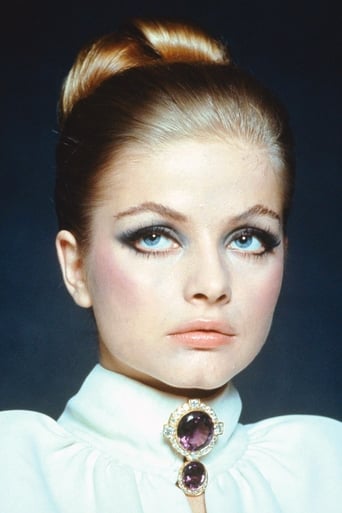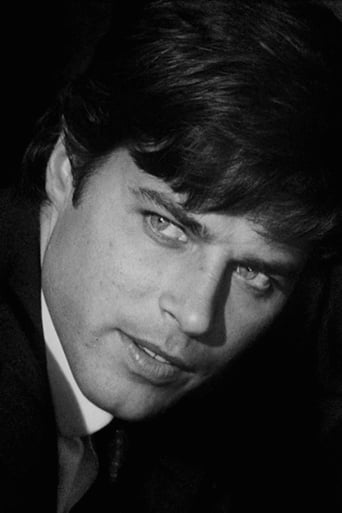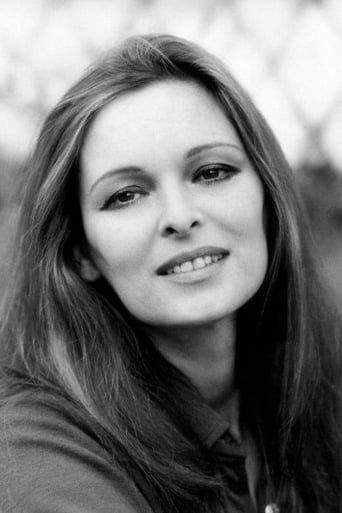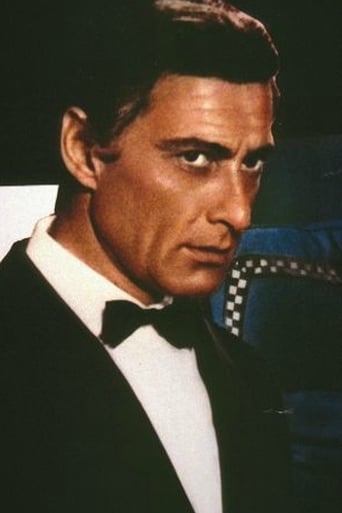ThiefHott
Too much of everything
Majorthebys
Charming and brutal
Myron Clemons
A film of deceptively outspoken contemporary relevance, this is cinema at its most alert, alarming and alive.
Sienna-Rose Mclaughlin
The movie really just wants to entertain people.
Bezenby
Poor Jean Sorel. He heads down to an underground car park to innocently park his car and some mysterious guy shoots him. As he hits the ground, instead of his life flashing before his eyes, an entire giallo film does instead, and not just the flashbacks of stuff that actually happened – this flashback contains his fantasies too!You see Jean is a young(ish) businessman working for his father in Morocco, although mooching off him while his brother (Giacomo Rossi- Stuart) does all the hard work might be a better description. When we first meet Jean he's frolicking around the beach with his new wife Lucia (including some underwater noodling – that's one detailed flashback!). Lucia seems to be interested in a local hippy type who's wandering around the beach, which Jean isn't too happy with. He also keeps hallucinating that he's with another lady, which confused the hell out of me at first. This other lady is Lucia's mum, and although Jean gets jealous of Lucia talking to the hippy (Eddie, his name is), he doesn't mind trying it on with her mum or becoming completely obsessed by her, and it doesn't help that she's hooked up with Eddie. This leads to Jean fantasising about shooting Eddie in the face with a rifle, which is a strange thing to have a flashback about.Things jump between Rome and Morocco while Jean flirts with Lucia's mum, argues with Lucia, discusses the 'hippy movement' on a yacht and such like. It's all kind of trippy and disjointed and although it's quite different from your usual giallo madness, there's not enough of the usual giallo madness here. Although the ending was pretty daft. Jean Sorel seems to have moved away from the Giallo genre following this and Short Night of the Glass Dolls – he was quite good though.
Red-Barracuda
A man called Giovanni is shot in an underground car park by an ominous old man. The rest of the story is told in disjointed flashbacks that piece together the scenario that resulted in this situation arising. It turns out that Giovanni is an idle playboy who has affair with his young wife's mother while holidaying in Morocco. The mother ends up taking up with an American drifter and Giovanni is consumed with jealousy; murder follows.The Double is a pretty interesting thriller. Its structure is one of the primary reasons why. The way in which scenes are edited together in a non-chronological way gives it a mysterious and dreamlike feel. The soundtrack accentuates this tone, seeing as it's a score that can best be described as breezy. The film benefits from the presence of Jean Sorel as Giovanni. Sorel starred in several gialli from the time and always seems to put in a solid turn. Also of note is Ewa Aulin as Sorel's young wife. Aulin had earlier appeared in the ultra-weird Death Laid an Egg, here she is also good and cute as a button; she even has time for an extended naked underwater swim, which was nice.This is a good film. It isn't a typical giallo; it's more of a psychological thriller. It's well acted and directed and it isn't particularly predictable. If you like Italian thrillers then you should like this too.
The_Void
Like Luigi Cozzi's The Killer Must Kill Again, and Aldo Lado's Short Night of the Glass Dolls, Romolo Guerrieri's The Double has tried to do something a little different with the common Giallo formula, and like the latter film; this one isn't entirely successful, although it's certainly an intriguing take on Italy's finest style of film-making. The plot is narrated via a series of flashbacks, and while this gives the film a rather disjointed feel, the talented director ensures that every scene flows well and is relevant to the plot. The focus of this movie isn't on murder, despite someone being shot in the opening scene and it's always clear that the characters are the star of this show. The film revolves around Frank; the man shot at the beginning, as he lies in a pool of blood, he thinks back to how he got into that position - a story that centres on the mother of his nineteen year old girlfriend. Frank is an architect living off his father's allowance and he's also a jealous lover. He doesn't like his girlfriend seeing an American holidaymaker, also staying in Morocco - but he also can't resist the lure of his girlfriend's sexy mother...The Moroccan locale that makes up the first part of the movie is beautifully shot, and director Guerrieri delights in overlapping his beautiful scenes with a catchy score from Armando Trovajoli. The film doesn't include a lot of tension or suspense, but The Double does manage to retain the viewer's interest by way of the characters' motivations. The film bathes in the glow of the people in the story, and this is one of the movie' strongest elements. The Double is brought to life by Jean Sorel, who takes the lead role. While his character is something of an interloper between the others in the plot, Sorel does well with what he has. Lucia Bosé and Ewa Aulin are both good as the female leads, and the director delights in capturing as much of their flesh as possible. The fact that the movie doesn't feature the stylish murders or exciting chase sequences that have made the sub-genre famous will leave some disappointed; and I've got to say that's true for me. Films such as The Forbidden Photos of a Lady above Suspicion have proved that sex and characters can carry a Giallo, but this one doesn't quite manage it. However; The Double is an interesting film and one that fans of Giallo will not want to miss.
Oliver Lenhardt
First I must confess that I'm not a big fan of gialli. I've seen enough of them to know that they almost invariably play gleefully on the audience's prurient and senselessly violent impulses, and, to boot, a good percentage of them are inept in the filmmaking department. There usually isn't much of interest for someone looking for quality cinema. THE DOUBLE is one of the exceptions.The film shares its flashback structure with Claude Sautet's poignant French drama LE CHOSES DE LA VIE. In addition, "The Double" would be a very fitting companion piece to Aldo Lado's MALASTRANA, a giallo which it closely resembles, and which also stars Jean Sorel.Frank (Sorel) is an indolent playboy living off proceeds from his father's business. As the film begins, Frank drives his Citroen into a Rome parking garage and is shot by a mysterious bearded man. The remainder of the story is a series of flashbacks, as the dying Frank recollects how he arrived at his present circumstance: Frank was married to the lovely but dimwitted Lucia(Ewa Aulin), but secretly pined after her mirror-image, more sophisticated mother Nora(Lucia Bose). When Nora became involved with an American drifter, Eddie(Sergio Doria), Frank was green with envy. Things spiral out of control....but not as one would expect. By the climax, the moral comes into focus: Keeping one's passions unchecked can lead to ruin. Not exactly a new notion, but it's intriguingly explored here."The Double" is not without its flaws. The (customarily, for an Italian film) incongruous folk music and the anything-goes attitude towards sex and lounging about are badly dated; early sections of the film are languorous and convoluted; the final scene is not quite clear, at least in the version I saw. I would love to see a subtitled incarnation of the film, as dubbing is oft disconcerting and poorly recorded.Director Romolo Guerrieri is the real star of the proceedings. His commanding style and aplomb with the intercutting is impressive. There are countless striking visual flourishes throughout.




